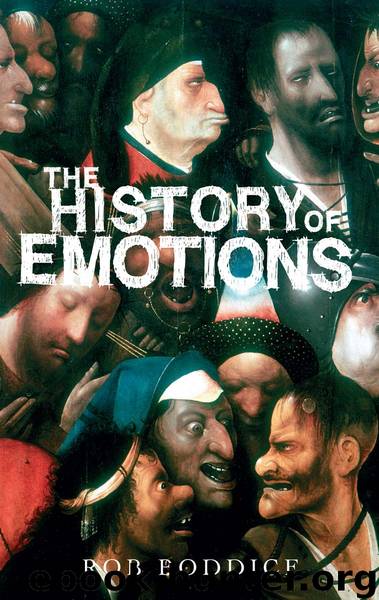The History of Emotions by Rob Boddice

Author:Rob Boddice
Language: eng
Format: epub
Publisher: Manchester University Press
6
EXPERIENCE, SENSES AND THE BRAIN
Take five
How do you feel? The question, a commonplace query if ever there was one, is actually enormously complex. That we handle it as a kind of banal enquiry is at once a testament to the ways in which we process our experiences in context, as well as being a pointer to how little reflexivity is generally applied to difficult questions. It is at once a question about our state of health, our emotional disposition in a given moment, our sentiments about a certain subject or event, an enquiry into our judgement (as a synonym for ‘what do you think?’) and a literal investigation into our senses, on three levels. It might ask us to identify the level of, say, pain in a given moment: during a dental procedure, for example. It might ask us to rate or evaluate another sort of sensory experience: how do you feel about the chocolate cake, about the noise levels, about the view? And it is also literally an enquiry into how we feel. What are the mechanisms involved in allowing us to make sense of the world? The conceptual confusion of all this, compounded by the semantic overlap, which conflates the sensory and the cognitive in the word ‘sense’, suggests the rich possibilities in a study of the senses. Moreover, it suggests that the senses ought properly to be a part of the history of emotions.
There have been significant inroads into the history of the senses, most of which connect to a history of the emotions, but seldom have historians of the emotions substantially noticed. In 1989, for example, David Howes made a strong case for the relationship of the senses to ‘affective mechanisms’ and demonstrated the extent to which certain senses, particularly the sense of smell, became more powerful from the mid-eighteenth century, whereas sight became less perspicacious in being able to discern – to see – the dynamics of social hierarchy.1 Shortly afterward, Alain Corbin explicitly proposed a radical history of the senses, which would be framed in part by entering into the sensual world of historical actors, constructing soundscapes and olfactory maps, but also, importantly, trying to reconstruct the specific historical tuning of the senses to those stimuli. In other words, the ‘historicity of the modalities of attention’ had to be taken seriously.2 The functioning of an ear, an eye, a nose, or at least the brain’s interpretation of signals from those organs, could not be understood to be ahistorical. Senses were conditioned in the past, much as we condition our own. The presence of odorous particulate matter in the atmosphere or of vibrations within the audible spectrum does not automatically lead to a smell evaluation or a listening evaluation of a certain kind. Our affective response to such things is based on where and when we are, as well as who we are and to what we are accustomed.
As with emotions, passions, sentiments and so on, the feelings and the senses have a history that is at once a history of culture and a history of the body.
Download
This site does not store any files on its server. We only index and link to content provided by other sites. Please contact the content providers to delete copyright contents if any and email us, we'll remove relevant links or contents immediately.
| Archaeology | Essays |
| Historical Geography | Historical Maps |
| Historiography | Reference |
| Study & Teaching |
Underground: A Human History of the Worlds Beneath Our Feet by Will Hunt(11257)
Navigation and Map Reading by K Andrew(4554)
Sapiens by Yuval Noah Harari(4537)
Barron's AP Biology by Goldberg M.S. Deborah T(3632)
The Sympathizer by Viet Thanh Nguyen(3481)
5 Steps to a 5 AP U.S. History, 2010-2011 Edition (5 Steps to a 5 on the Advanced Placement Examinations Series) by Armstrong Stephen(3406)
Three Women by Lisa Taddeo(2920)
The Comedians: Drunks, Thieves, Scoundrels, and the History of American Comedy by Nesteroff Kliph(2790)
Water by Ian Miller(2584)
Drugs Unlimited by Mike Power(2192)
DarkMarket by Misha Glenny(1847)
The House of Government by Slezkine Yuri(1844)
The Library Book by Susan Orlean(1737)
A Short History of Drunkenness by Forsyth Mark(1720)
Revived (Cat Patrick) by Cat Patrick(1678)
The Woman Who Smashed Codes by Jason Fagone(1649)
The House of Rothschild: Money's Prophets, 1798-1848 by Niall Ferguson(1618)
And the Band Played On by Randy Shilts(1615)
Birth by Tina Cassidy(1572)
